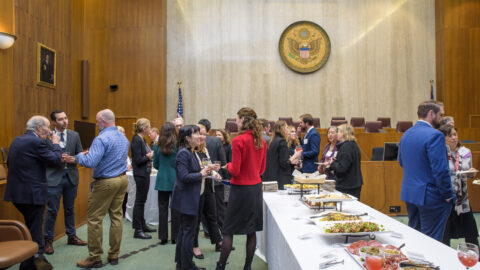
One of the clients represented by the Northern California Collaborative for Immigrant Justice (NCCIJ) came to the U.S. as a refugee when he was a toddler. He was born at a refugee camp in Thailand after his family fled the violent Khmer Rouge regime in Cambodia. He had lived in the US for more than thirty years when he was detained by U.S. Immigration and Customs Enforcement (ICE) in 2017 as part of a nationwide sweep of Cambodian nationals who had already undergone immigration court proceedings. The NCCIJ attorney worked with criminal defense counsel to vacate his drug conviction, and then successfully reopened and reversed his immigration court proceedings, restoring his lawful permanent residence (green card). Unfortunately, he was deported just before his criminal conviction was vacated, but he was, fortunately, able to return to the US a few months later, on November 2, 2018, as a lawful permanent resident. (Read more in the Sacramento Bee)
This story is just one example of the tremendous work that NCCIJ has been able to do since securing funding in late 2016 to launch a project to provide legal representation and regional coordination around increasing access to legal services for detained immigrants.
The funded project, with the Justice & Diversity Center of the Bar Association of San Francisco (JDC) and three immigrant removal defense organizations, was an initiative of a larger regional collaborative, NCCIJ, comprised of dozens of organizations and agencies. The collaborative produced a 2014 report,[1] written by Stanford Law School Immigrants’ Rights Clinic in partnership with NCCIJ, focusing on the impact of representation on immigrants detained in the San Francisco region (which spans from Kern County up to the Oregon border) and the need for universal representation in the region. United by the goal of universal representation for individuals in immigration detention in the region, NCCIJ was finally able to launch a funded project in early 2017, with JDC serving as the fiscal and coordination lead.
Since early 2017, JDC has provided fiscal leadership for the three other NCCIJ-funded organizations, in addition to technical assistance, service coordination, and intake and referral services for the larger regional coalition. JDC also houses the NCCIJ coordinators, who maintain primary responsibility for coordinating the funded project and the larger coalition, overseeing the Attorney of the Day Program on the San Francisco Immigration Court’s detained dockets, and increasing regional capacity through mentorship, training, and advocacy. The three NCCIJ-funded removal defense organizations that provide direct legal representation to NCCIJ clients are Centro Legal de la Raza, Community Legal Services in East Palo Alto, and Asian Americans Advancing Justice—Asian Law Caucus.
In its first two years of operation, NCCIJ opened over two hundred and sixty detained immigration cases for direct representation. The impact of NCCIJ-funded representation has been extraordinary, and NCCIJ-supported representation has resulted in success rates approximately five times better than the rates among unrepresented individuals. Additionally, the provision of limited scope legal services will generally reduce the number of days that individuals spend in detention by approximately twelve days on average, which can minimize hardships to the detained individual and their loved ones that result from their continued detention.[2]
In addition, between March 2017 and December 2019, the NCCIJ coordination team successfully placed over ninety unrepresented detained immigrants with pro bono counsel, including engaging attorneys and agencies that were not previously providing detained representation. Among these cases were several identified through the coordination of the AILA Mesa Verde Pro Bono Project, for which JDC and NCCIJ coordinated intake, referral, and placement of recent-arrival asylum seekers, mentorship of pro bono attorneys, and collaboration with regional and national partners to increase pro bono representation for detained immigrants.
In total, JDC’s Attorney of the Day Program on the detained dockets, which I oversee with the support of numerous NCCIJ attorneys, assisted over fifteen hundred unrepresented individuals appearing before the San Francisco Immigration Court. The pro bono Attorney of the Day Program utilizes experienced immigration attorneys to provide essential legal information and advice to those detained, at their Master Calendar hearings. The individuals appearing on these dockets are detained in the jurisdiction of the San Francisco Immigration Court, which covers Central and Northern California, and includes four facilities: Mesa Verde Detention Facility in Bakersfield, Yuba County Jail in Marysville, Federal Correctional Institution in Dublin and the Taft Correctional Institution in Taft.
In addition, the funded NCCIJ organizations have provided extensive legal services to detainees at all four of the facilities where ICE detains adults in the San Francisco Immigration Court jurisdiction, including 236 on-site Know Your Rights visits.
Furthermore, the NCCIJ coordination team at JDC has provided additional legal assistance to over seven hundred individuals identified through the Attorney of the Day Program, detention center visits, and telephone calls to JDC. For example, the team has conducted telephonic consultations (when in-person consultations were not possible or were insufficient), mailed legal self-help materials, contacted detainees’ family and friends to provide legal information, and provided telephonic individual hearing preparation assistance for several unrepresented detainees who would represent themselves at their final merits hearings. I have also engaged in several activities to increase attorney capacity to serve detained immigrants—including legal training sessions, technical support, and mentorship—as well as to educate the community regarding important rights that may help them avoid detention and to preserve their rights in the event of detention.
In addition, NCCIJ has cultivated and coordinated a broad network of legal service providers and advocates, made significant contributions to a national project at the epicenter of nationwide advocacy for universal representation, pioneered its own data studies regarding the unrepresented individuals NCCIJ serves, and improved policies and practices to reduce immigrants’ vulnerability to unfair deportation practices. These efforts have proved enormously successful, particularly in light of some recent significant changes in the detained landscape in the region, and impacted the lives of hundreds of immigrants and their families throughout California, as well as in other states.
About the author:
Valerie Anne Zukin, is the Lead Attorney Coordinator for the Northern California Collaborative for Immigrant Justice (NCCIJ), a regional collaborative for detained immigrant representation comprised of 35 organizations and agencies dedicated to providing and expanding pro bono detained representation in the San Francisco region. In this role, Zukin facilitates sharing best practices and strategy around litigation and advocacy and provides technical assistance and training. She also serves as the lead coordinator for the AILA Mesa Verde Pro Bono Project for recent-arrival asylum seekers and administers the pro bono Attorney of the Day Program for the detained dockets at the San Francisco Immigration Court. She previously practiced at Van Der Hout, Brigagliano & Nightingale from 2011 to 2017, and the Northwest Immigrant Rights Project from 2007 to 2011, where she represented clients in complex immigration matters before the immigration agencies and federal courts. Valerie received her B.A. from Haverford College and her J.D. from Tulane University Law School.
[1] Jayashri Srikantiah and Lisa Weissman-Ward, et. al., Access to Justice for Immigrant Families and Communities: Study of Legal Representation of Detained Immigrants in Northern California, Northern California Collaborative for Immigrant Justice, Oct. 2014, available at https://www-cdn.law.stanford.edu/wp-content/uploads/2015/07/11-4-14-Access-to-Justice-Report-FINAL.pdf.
[2] Executive Office for Immigration Review, Cost Savings Analysis – The EOIR Legal Orientation Program, 2012, available at https://www.justice.gov/sites/default/files/eoir/legacy/2013/03/14/LOP_Cost_Savings_Analysis_4-04-12.pdf.




